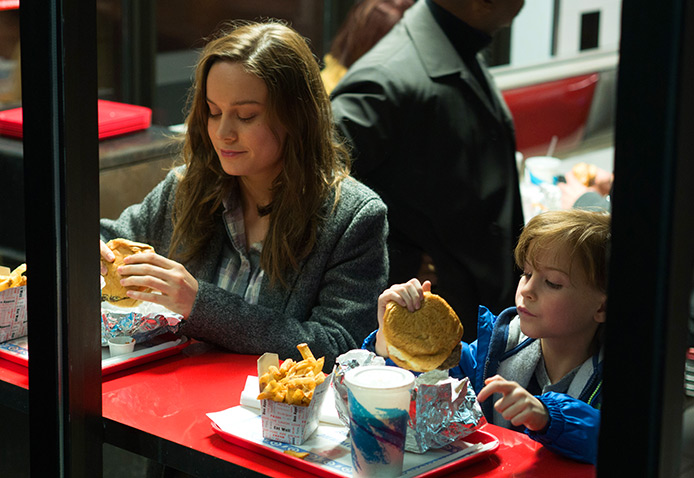
Equal parts thriller, mother and son love story, and aftermath picture of coping with the outside world, Irish filmmaker Lenny Abrahamson’s “Room” is a deeply moving and suspenseful drama that often has the power to emotionally devastate. Perhaps just as dolorous is how the picture can never quite live up to the transformative performances of its leads, Brie Larson and Jacob Tremblay, who deliver astonishing and revelatory turns.
“Room” begins in media res: five-year-old Jack (Tremblay) and Ma (Larson) have been held captive for seven grueling years in a small, shed in some undisclosed town. Their existence is made up of routines to keep the innocent boy occupied, and lies to make Jack, who has never known anything other than the claustrophobic confines of their cramped 11×11 cell, ignorant of the world beyond their prison. Their mother/son convention also includes Jack sleeping in an armoire to avoid witnessing the traumatic ritual of their captor entering his mother’s bed each night.
READ MORE: Brie Larson Breaks Free In First Trailer For Lenny Abrahamson’s ‘Room’

As Jack turns five, his curiosity growing and his mother’s mental stability starting to fray, Ma understands the boy cannot endure this imprisonment much longer and she concocts a desperate plan for their escape. Minor spoilers here, but they are part of the trailer and all marketing materials. Once they finally taste freedom and reach the outside, “Room” arguably becomes a different (and much better) picture: about a boy grappling with the jarring realities of a world he’s never known, a struggling mother desperately clinging to the hope that she’ll be fit for her son, and how the duo’s love for each other is ultimately their salvation.
“Room” is full of emotionally harrowing and wrenching moments, many of which will genuinely gut you or precipitate the flow of tears. The way Larson and Tremblay play off and with each other is remarkable, but the movie is not without flaws. The incarceration to freedom ratio is a bit out of synch even though they are symbiotic. “Room” spends too much time constrained. While you need to witness the psychologically bruising impact of their lock-up to understand the disorienting affect it has on their freedom, the movie, which has some pacing issues too, just idles there for too long.
 READ MORE: Telluride 2015: 10 Must See Films From A Killer Lineup
READ MORE: Telluride 2015: 10 Must See Films From A Killer Lineup
But “Room” also has some nerve-wrackingly tense and anguishing sequences that hit their mark with extraordinary feeling. The moment of escape — set to This Will Destroy You’s “The Mighty Rio Grande” — is so heartstopping and emotionally excruciating you’ll forgive the movie for jacking that same song from “Moneyball.” And when Jack and Ma are finally reconciled, their reunion delivers a blow so cathartic and shattering, you’ll be excused if you fall to pieces.
The underutilized Brie Larson, who blindsided nearly everyone with her dramatic chops in “Short Term 12” (she’d appeared in mostly light comedy up until then, and even started as a teen pop singer) is once again in terrific form, and it’s probably only a matter of time before she leaves behind relatively unremarkable roles like the object-of-affection in “21 Jump Street” for good. But she’s even arguably upstaged by Jacob Tremblay’s breakthrough performance — his raw, wounded, and fearful shell is so real he will break your heart.

Adapted by Emma Donoghue from her own critically-acclaimed novel, “Room” has some script hiccups. William H. Macy’s father character turns up for basically one sequence of family conflict and then is abruptly whisked away. The typically reliable Joan Allen, as Larson’s bereaved mother, has some great scenes, but the movie seems to be unsure of how to connect the mother and daughter conflict as potently as the mother and son dynamic, even though they are part of the same thematic conversation.
“Room” is a better, more engaging aftermath film than it is an incarceration one (even if the second half can become rather melodramatic) and the movie starts to really take off once Ma and Jake are freed. Abrahamson is a terrifically versatile filmmaker (see the absurdist comedy of “Frank,” next to the searing moral drama of “What Richard Did”), but perhaps his greatest strength is his ability to coax breathtaking performances out of actors. Formally, “Room” isn’t as sure-footed as its deeply authentic and credible performances. A cloying voice-over from Jack doesn’t really work, and there is an indecisiveness to the stylistic choices to the room, and the confines of the spatial dimension are never quite as defined as they should be.

Stephen Rennicks’ (“Frank”) doleful score is top notch, but it’s unfortunate how much the conclusion over-swells, mildly undermining all the beautiful work that came before. The final shot is perhaps something more befitting of a Ron Howard film, and it’s little missteps like this that hurt the film bit by bit.
Co-starring Sean Bridgers and Tom McCamus, aside from the intimate and soul-baring strengths of its two leads, the movie’s sharpest insights are the disconcerting notions of the horrors of the world we make for our children and how a kind of Stockholm syndrome pang can form — sometimes we crave the comforts of trauma because they are at least familiar.

Danny Cohen’s (“The Danish Girl,” “Les Miserables”) cinematography is expressively grim and cold, especially when the family is still trapped. As the aperture opens in tandem with independence and the ideas of trying to make sense of this unfamiliar world, “Room” takes on joyful, stirring, and predictable dimensions. As the movie’s “love conquers all” theme fully coalesces, it’s frustratingly both poignant and just a smidge too treacly.
Still, “Room” has unforgettable, must-witness performances, and its soulful mother and son narrative is one of the most touching dynamics you’ll see in theaters this year. [Movie: B, Performances: A]
This is a reprint of our review from the 2015 Telluride Film Festival.

